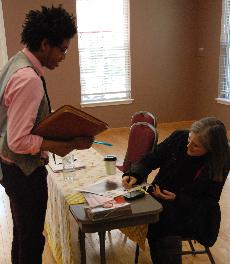“Democracy is a messy thing and it’s our job to capture it all,” said Amy Goodman at her lecture in the Community Center on April 8. Despite the event’s starting almost an hour late, people packed the room. As the main host of the alternative news program Democracy Now!, which WQFS broadcasts, Goodman spoke on current events, activism, the media and everyday people who become heroes. She began by talking about Barack Obama’s election.
“November fourth was a historical moment,” said Goodman. “The world heaved a sigh on that day. It was not just a national election-it was a global phenomenon. He’s the first African-American president of the United States in a country that has a legacy of slavery.”
From there, Goodman delved back through history, tracing her way from the current White House to another house with a tarnished legacy: Mount Misery, the home of the slaveholder who beat and tortured Frederick Douglass.
“From Mount Misery to Mount Hope,” said Goodman as she told the story of how she traveled to Mount Hope Cemetery in Rochester, N.Y., where Douglass and his close friend Susan B. Anthony are buried.
“How interesting that these activists saw the media as a means to freedom,” said Goodman as she described how both Douglass and Anthony used the media to advocate for the abolitionist and women’s rights movements.
“In my view the media is a huge kitchen table we all sit around and discuss the issues of the day . and anything less than that is a disservice to a democratic society.”
Goodman showed how Douglass and Anthony’s tradition of civil rights advocacy continues today with the gay rights movement and the recent victories for gay marriage in Iowa and Vermont.
In an impromptu move, Goodman pulled out her cell phone and called her brother David, who was present in the Vermont legislature when it voted to overrule Governor Jim Douglas’ veto.
He described how some of the most moving testimonies during the hearings leading up to the vote came from the children of gay and lesbian parents, particularly 12-year-old Evann Orleck-Jetter.
“I think it just cut through so much of the rhetoric,” said Goodman. “There’s tremendous power when young people speak and I think she really demonstrated that.”
Oreck-Jetter, a teenager who stood up in defense of an issue important to her, embodied the theme of the everyday hero, a thread woven through Goodman’s speech and her most recent book, “Standing up to the Madness: Ordinary Heroes in Extraordinary Times.”
Goodman finished by relating two personal stories from her work as a journalist. While covering the 2008 Republican National Convention, she and two others from Democracy Now! were violently arrested at a protest. Goodman was charged with interfering with a peace officer.
“If only a peace officer was there!” said Goodman.
Her second story also involved a violent confrontation with police. In 1991, Goodman and journalist Allan Nairn were in East Timor covering the independence movement. While attending the funeral of a young man shot in a Catholic church by the Indonesian military, they witnessed Indonesian soldiers open fire on the procession.
The soldiers then turned on Goodman and Nairn, beating them badly but sparing their lives.
“We knew we had to make it clear who we were because the Indonesian military had committed many mass murders before but never in front of Western journalists,” said Goodman. “We believe that because we were from the same country their weapons were from, they would have had to pay a price for killing us that they never had to pay for killing the Timorese.”
Goodman and Nairn narrowly escaped back to the United States, where they brought word of the massacre to the world, marking the beginning of the largely student-led movement to end the U.S.’s military aid to Indonesia.
Goodman’s talk resonated with many students.
“WQFS is such a big part of our community and the greater Greensboro community,” said sophomore Jordan Auleb. “It’s good to have someone who is encouraging the use of the media by normal citizens, reclaiming it from corporations’ control and using that as a means of protest and to inform ourselves and inform others.”
Others were motivated by the stories of everyday heroism.
“She makes me want to do something,” said sophomore Scottie Mitchell. “Especially when she was talking about her new book, she was talking about everyday people that did these really awesome things and it reminded me that you don’t have to be really famous or important to make a big difference.

